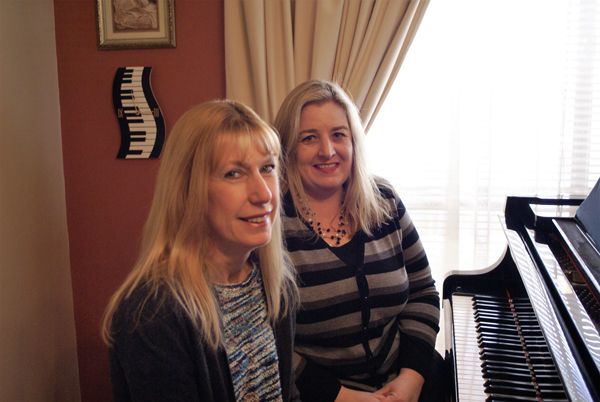Over the years, the SA/NT branch of the AMEB has started a number of teachers’ groups in different regions — and one of them in particular has far outstripped the organisers expectations! In the northern suburbs of Adelaide, a community of music teachers is flourishing under the united efforts of piano teachers Julie Candido and Karen Clarke. We caught up with them to discover the secrets to a successful teachers’ group:

Elsabeth: What is your background in music, and how did you come to teaching?
Karen: I learned piano right through school, and did my Grade 7 AMEB exam in Year 12. After I’d finished school I went into retail, and about 16 years later I decided it was time to change my career. Then I studied music, starting off at Flinders Street School of Music and ending up at university, and I’ve been teaching ever since.
Julie: I started learning piano at the age of 7, and then I went into retail as well, becoming a retail manager. At the same time, I performed in a band professionally on the weekends and had a few private piano students. I started teaching in schools when someone approached me, and asked if I could teach group keyboard lessons. After that, I began giving one-on-one lessons, and I went back to study piano myself to further my piano and pedagogy skills.
E: What does your teaching week look like these days?
K: When I started off teaching, it was on a part-time basis while my children were growing up. Now that they’ve finished school I work full time, teaching at four different schools and in my private studio.
J: I’ve done the opposite to Karen — at one stage I was doing six and a half days teaching! But now I’ve cut right back so that I can spend more time with my family. After my children finish school, I plan to increase my hours again.

E: How did you first start working together?
J: When I moved into the area, I was looking for a piano teacher for my own children and I found Karen. After a long first conversation, we both decided that I would teach her daughter piano and she would teach my daughters, and the rest is history!
K: We still teach independently but we come together for exams, and both of our students sit for their exams at Julie’s house. All of the parents appreciate this because they don’t have to drive for an hour to have the exam in the city! The students like it as well because the environment is familiar.
Over the years, we’ve also done concerts together — sometimes Julie accompanies me on piano while I play flute, or we play duets or page turn for each other’s students.
E: How did your partnership grow to become the Northern Suburbs Zone Group?
J: Julie Cranswick, AMEB State Manager for South Australia and the Northern Territory, was the one who got us all together. She contacted me asking if I would be interested in hosting a group in my area. I said, “Well, we could do it at my house, and start from there!”
K: The group has been going for over four years now, and we are growing every year. The AMEB sends out the invitations to the teachers in our area, and the meetings are held at either Julie’s house or at my house. We try to keep things relaxed and informal — we all sit in my lounge or in Julie’s kitchen, drinking tea and coffee and talking about teaching. It’s great! We’ve met so many wonderful local teachers. Our meetings normally go for two to three hours on a Saturday afternoon, but sometimes they’re longer as we all have so much to talk about.
E: What sort of things do you do when you meet as a group?
J: Each time we organise a meeting with Julie Cranswick from the AMEB, she always asks us what topics we would like to discuss. Sometimes she attends the meetings herself, to answer any questions about exams or to discuss AMEB-related topics. For instance, our most recent one was about Rockschool, and it was our best-attended event yet!
K: Other times, the AMEB just sends out the invitations. In these meetings, we normally start with repertoire to break the ice. Many teachers bring music that they use in their studios, or new music that they have discovered, and then we go on to discuss other areas of teaching. When questions come up, there is always someone at the meeting who can help by sharing their own experiences.
J: It’s great how so many of us now use music recommended in the meetings for our own students. The group is also valuable because teaching can be very isolating, and it’s comforting to know local teachers that you can call any time for a chat, or for advice, or to exchange resources. And when you have a student moving on, maybe transferring from primary to high school, you can recommend somebody, because you already know other teachers who have the same teaching ethic.
E: So what’s coming up for the group in the future?
J: In the future we’re going to have concerts for our students, so that they can practice performing. At our last meeting, some teachers suggested that we should do this before exams. That came up because this year, six of the teachers are having their students examined at my house. None of this would have been possible without the Group!
K: I always look forward to every meeting. It’s great to catch up with friends and to meet the new teachers who come along. And every time we ask the group if they want to do another meeting, the answer is yes! Everyone is so positive, I always leave feeling very inspired. I’d recommend starting a local group like this to anyone!
